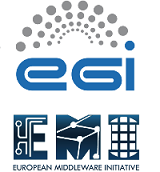Speaker
Overview
The stated goal of the European Grid Infrastructure is to facilitate the work of established and emerging multi-national user communities. The growing user demands have provided, and will continue to provide, the necessary push for development and extension of the grid infrastructure. Therefore, the active support for these communities is a primary concern for the members of the EGI collaboration. The presentation introduces the goals of EGI user support activities, the structure and linkage of user support teams and gives an overview of the services and tools that the different stakeholders provide for multi-national user communities.
Conclusions
The presentation gives an overview of user support processes and activities from NGIs’ perspective: how the NGIs are involved in the process and how can improve their commitment even further. The key focus of the integrated activities is to support sustainable international research groups through the Virtual Research Community (VRC) model. An EGI VRC represents a community of researchers with an established presence in a scientific or other research field and with the shared goal to develop themselves into self-sustainable grid communities. The long term sustainability of EGI depends on the success of organising existing EGI users and emerging scientific communities into VRCs.
URL
http://www.egi.eu/user-support/
https://wiki.egi.eu/wiki/TNA3.3_NGI_User_Support_Teams
Impact
Efficient support for users is the primary interest of all the EGI stakeholders. The operation of efficient support activities is a nontrivial task, given the highly distributed nature and heterogeneity of infrastructure components, user support teams and user communities. EGI managed to define and setup processes and tools to deal with this complexity. The presentation provides an excellent opportunity for all the EGI stakeholders to learn about user support mechanisms and to see how their partners and the various NGIs are involved in this process.
Description of the work
The primary stakeholders of EGI user support services are the User Support Teams of National Grid Initiatives/Infrastructures (NGIs). While the primary responsibility of these NGI User Support Teams is to serve users and user communities inside their own countries, through their involvement in international collaborations – under the EGI umbrella – they share and expand their services for the benefit of large, multi-national user communities. The User Community Support Team (UCST) of the Amsterdam-based EGI.eu organisation provides coordination for this activity. The UCST ensures that the national efforts fit together at the European level, they satisfy the demands of multi-national scientific collaborations and that the evolution of support tools and mechanisms is aligned with the long term goals of communities.
The user support services are implemented as a mixture of human services, software services and feedback mechanisms. While users are mostly served by human services (e.g. by trainers who provide courses, by consultants and technicians who help porting of applications) software services allow remote interactions with experts (e.g. a helpdesk system) or facilitate the provision of human oriented services (e.g. a training event registry).
NGIs are heterogeneous in terms of the size and composition of their user communities, the size and expertise of their user support teams. Consequently, NGIs are not equally active and strong in all the previously described user support fields. The EGI.eu UCST has defined and runs mechanisms to understand the strengths and weaknesses of each of the NGI USTs and to map their offerings and capabilities to the requirements of multi-national user communities. These mechanisms, namely the Wiki pages, the knowledge bases, the email lists, the Web pages, surveys, web forms, Request Tracker system and various user-facing technical services will be all overviewed and detailed in the presentation.

